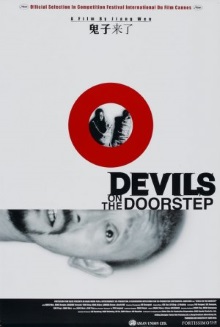
These days a large proportion of the backlogged films on our shared watch list are Chinese ones due to my needing to catch up on so many well known exemplars of Chinese cinema. Devils on the Doorstep is one such entry that my wife asked to watch. We’ve seen veteran actor Jiang Wen plenty of times, most recently in Red Sorghum for example, but I believe that this is one of the only times we’ve seen him in a film in which he is also the director.
During the closing days of the Second World War, a resident named Ma Dasan of a village near the foot of the Great Wall is rudely disturbed in the middle of the night. An unseen man with a pistol deposits two prisoners tied up in gunnysacks with him and orders that they be kept alive until he returns for them in a few days. It turns out that they are a Japanese soldier named Kosaburo Hanaya and a Chinese translator who works for the Japanese named Dong Hanchen. The villagers agonize over what to do about them, especially as Hanaya alternately tries to alert passing Japanese soldiers and tries to taunt them into killing him. Anxious not to be killed, Dong tries to smooth things over. When the mysterious man fails to return for the prisoners, the villagers decide to just kill them but Ma finds it impossible to do the deed. Eventually the villagers end up keeping the pair for months.
A fine example of black humor, Devils on the Doorstep is both funny and unpredictable. Some of its gags are pretty crude, such as Hanaya repeatedly calling Ma his grandfather, at first because he is deceived and later because he wants to beg for his life, but they still manage to elicit the desired laughs. What’s clever is that these same lines, when spoken in the presence of Hanaya’s commanding officer, suddenly takes on a darkly menacing tone. Jiang himself is great as Ma, who is a sort of gullible fool. His amazed reactions as he listens to the incredible stories of two different assassins he tries to hire to kill the prisoners on his behalf prove that he has plenty of comedic talent.
It’s also interesting to consider the question of whether or not this is, like so many Chinese films set during the Second World War, an anti-Japanese film. Jiang himself says that it isn’t but it presents the Japanese as unambiguously villainous. It’s pretty hard to argue otherwise once you realize that the commanding officer did everything that he did even though he knew that the Japanese had already surrendered. On the other hand, it doesn’t exactly present the Chinese in a good light either. The villagers seem incredibly dumb and naive, so much so that it’s impossible to imagine the situation ending well for them. It creates a kind of incongruity in the film that I don’t quite know what to make of. Yes, the antics of the villagers are funny but how it ends for them is not and you can see it coming from a long way away.
On balance, I enjoyed the film and found it funnier than I expected it to be. It’s also wacky enough to be a film that will probably be remembered. But I think it’s still more about being anti-Japanese and less about offering some sort of insight about the Chinese people than the director would like to claim.